四年级英语下册知识点梳理
- 格式:doc
- 大小:53.00 KB
- 文档页数:9
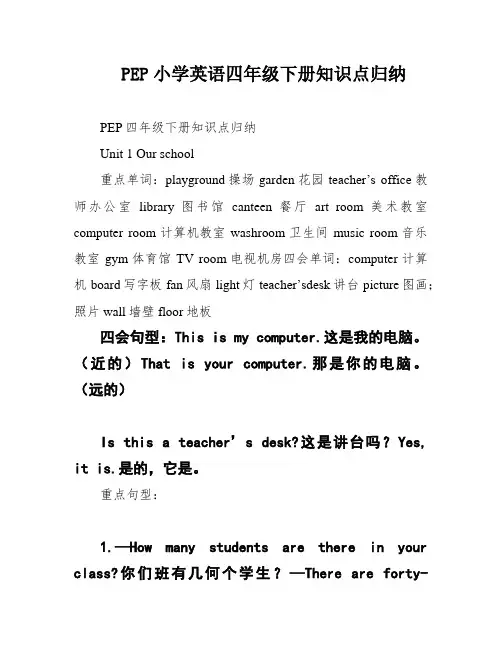
PEP小学英语四年级下册知识点归纳PEP四年级下册知识点归纳Unit 1 Our school重点单词:playground操场garden花园teacher’s office教师办公室library图书馆canteen餐厅art room美术教室computer room计算机教室washroom卫生间music room音乐教室gym体育馆TV room电视机房四会单词:computer计算机board写字板fan风扇light灯teacher’sdesk讲台picture图画;照片wall墙壁floor地板四会句型:This is my computer.这是我的电脑。
(近的)That is your computer.那是你的电脑。
(远的)Is this a teacher’s desk?这是讲台吗?Yes, it is.是的,它是。
重点句型:1.—How many students are there in your class?你们班有几何个学生?—There are forty-five.有四十五。
2.—Doyouhave a library?你/你们有藏书楼吗?—(一定)Yes, I do./Yes, we do.是的,我有。
/是的,我们有。
(否定)No, I don’t./ No, we don’t.不,我没有。
/不,我们没有。
3.—Whereis the canteen.食堂在那里?—It’s on the first floor.在一楼。
4.—Welcome to our school. This way, please.欢送来到我们黉舍。
这边请。
5.—Your school is beautiful.你们学校很漂亮。
—Thank you.谢谢。
Unit 2What time is it?重点单词:lunch午餐English class英语课music class音乐课breakfast早餐dinner晚餐P.E. class体育课get up起床go to school上学go home回家go to bed上床睡觉just a minute再多一会儿四会单词:one一two二three三four四five五six六seven七eight九ten十math数学Chinese语文English英语P.E.体育music音乐class课程四会句型:What time is it ?几点了?It’s two o’clock.两点整。
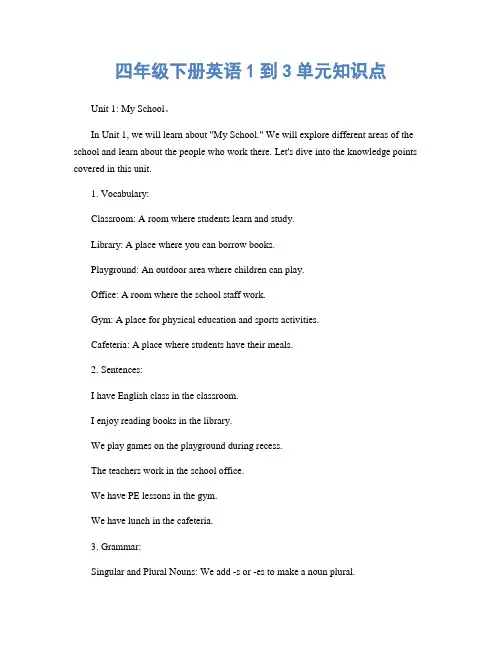
四年级下册英语1到3单元知识点Unit 1: My School。
In Unit 1, we will learn about "My School." We will explore different areas of the school and learn about the people who work there. Let's dive into the knowledge points covered in this unit.1. Vocabulary:Classroom: A room where students learn and study.Library: A place where you can borrow books.Playground: An outdoor area where children can play.Office: A room where the school staff work.Gym: A place for physical education and sports activities.Cafeteria: A place where students have their meals.2. Sentences:I have English class in the classroom.I enjoy reading books in the library.We play games on the playground during recess.The teachers work in the school office.We have PE lessons in the gym.We have lunch in the cafeteria.3. Grammar:Singular and Plural Nouns: We add -s or -es to make a noun plural.Example: book books, desk desks。
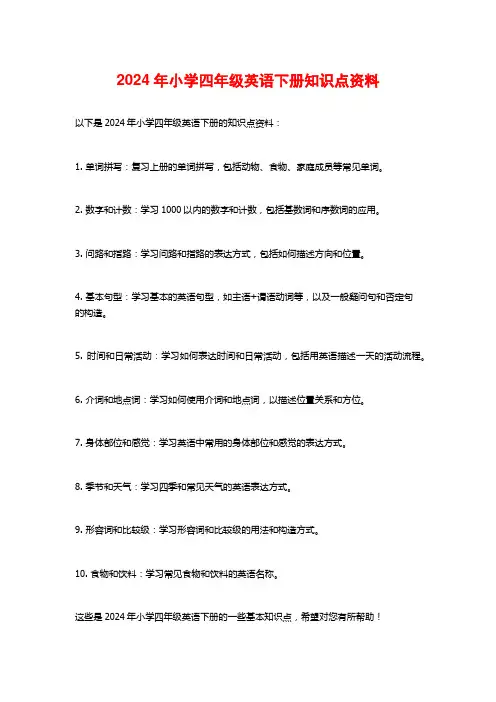
2024年小学四年级英语下册知识点资料
以下是2024年小学四年级英语下册的知识点资料:
1. 单词拼写:复习上册的单词拼写,包括动物、食物、家庭成员等常见单词。
2. 数字和计数:学习1000以内的数字和计数,包括基数词和序数词的应用。
3. 问路和指路:学习问路和指路的表达方式,包括如何描述方向和位置。
4. 基本句型:学习基本的英语句型,如主语+谓语动词等,以及一般疑问句和否定句
的构造。
5. 时间和日常活动:学习如何表达时间和日常活动,包括用英语描述一天的活动流程。
6. 介词和地点词:学习如何使用介词和地点词,以描述位置关系和方位。
7. 身体部位和感觉:学习英语中常用的身体部位和感觉的表达方式。
8. 季节和天气:学习四季和常见天气的英语表达方式。
9. 形容词和比较级:学习形容词和比较级的用法和构造方式。
10. 食物和饮料:学习常见食物和饮料的英语名称。
这些是2024年小学四年级英语下册的一些基本知识点,希望对您有所帮助!。
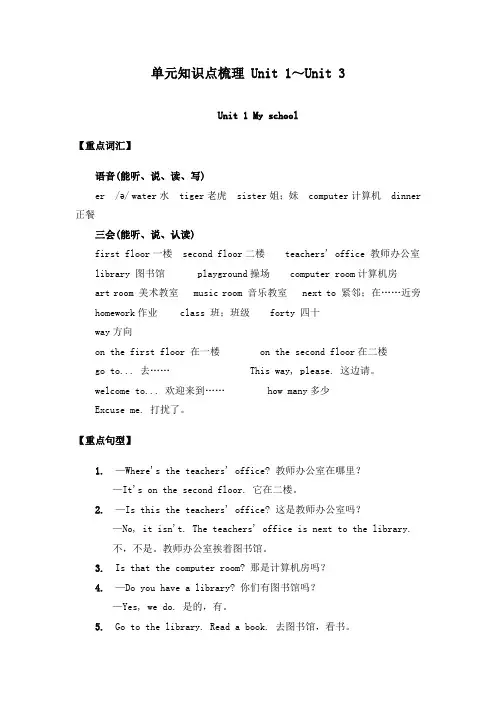
单元知识点梳理 Unit 1~Unit 3Unit 1My school【重点词汇】语音(能听、说、读、写)er /ə/ water水tiger老虎sister姐;妹computer计算机dinner 正餐三会(能听、说、认读)first floor一楼second floor二楼teachers' office 教师办公室library 图书馆playground操场 computer room计算机房art room 美术教室 music room 音乐教室 next to 紧邻;在……近旁homework作业class 班;班级 forty 四十way方向on the first floor 在一楼on the second floor在二楼go to... 去……This way, please. 这边请。
welcome to... 欢迎来到……how many多少Excuse me. 打扰了。
【重点句型】1.—Where's the teachers' office? 教师办公室在哪里?—It's on the second floor. 它在二楼。
2.—Is this the teachers' office? 这是教师办公室吗?—No, it isn't. The teachers' office is next to the library.不,不是。
教师办公室挨着图书馆。
3. Is that the computer room? 那是计算机房吗?4.—Do you have a library? 你们有图书馆吗?—Yes, we do. 是的,有。
5. Go to the library. Read a book. 去图书馆,看书。
6. Go to the teachers' office. Say hello. 去教师办公室,问好。
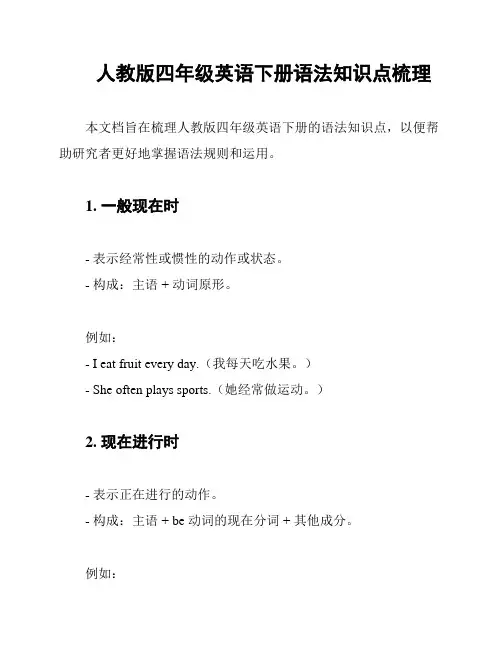
人教版四年级英语下册语法知识点梳理本文档旨在梳理人教版四年级英语下册的语法知识点,以便帮助研究者更好地掌握语法规则和运用。
1. 一般现在时- 表示经常性或惯性的动作或状态。
- 构成:主语 + 动词原形。
例如:- I eat fruit every day.(我每天吃水果。
)- She often plays sports.(她经常做运动。
)2. 现在进行时- 表示正在进行的动作。
- 构成:主语 + be 动词的现在分词 + 其他成分。
例如:- They are watching TV now.(他们正在看电视。
)- We are playing soccer in the park.(我们正在公园踢足球。
)3. 一般过去时- 表示过去发生的动作或状态。
- 构成:主语 + 动词过去式。
例如:- She visited her grandparents yesterday.(昨天她去拜访她的祖父母。
)- They played soccer last weekend.(上周末他们踢足球。
)4. 一般将来时- 表示将来要发生的动作或状态。
- 构成:主语 + will + 动词原形。
例如:- I will go to the park tomorrow.(明天我会去公园。
)- He will study English next month.(下个月他会研究英语。
)5. 祈使句- 表示请求、命令、建议等。
- 构成:动词原形(谓语动词省略主语)。
例如:- Sit down, please.(请坐。
)- Open the window.(打开窗户。
)6. There be 句型- 表示某地存在某物或某人。
- 构成:There + be动词 + 介词短语。
例如:- There is a book on the table.(桌子上有本书。
)- There are many students in the classroom.(教室里有很多学生。
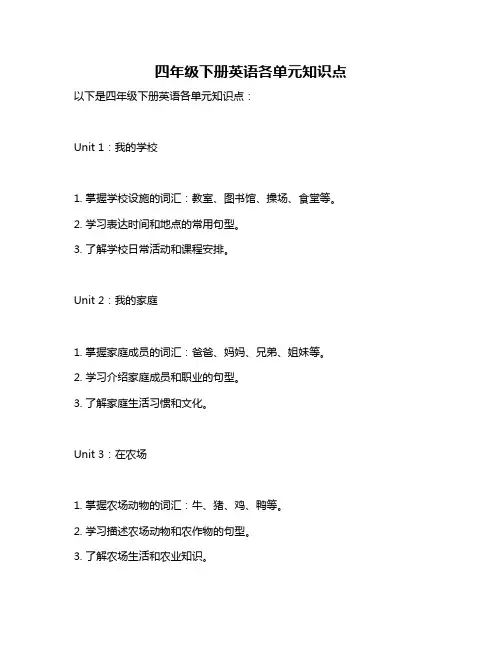
四年级下册英语各单元知识点以下是四年级下册英语各单元知识点:
Unit 1:我的学校
1. 掌握学校设施的词汇:教室、图书馆、操场、食堂等。
2. 学习表达时间和地点的常用句型。
3. 了解学校日常活动和课程安排。
Unit 2:我的家庭
1. 掌握家庭成员的词汇:爸爸、妈妈、兄弟、姐妹等。
2. 学习介绍家庭成员和职业的句型。
3. 了解家庭生活习惯和文化。
Unit 3:在农场
1. 掌握农场动物的词汇:牛、猪、鸡、鸭等。
2. 学习描述农场动物和农作物的句型。
3. 了解农场生活和农业知识。
Unit 4:天气
1. 掌握描述天气的词汇:晴天、雨天、雪天、多云等。
2. 学习表达温度和天气的常用句型。
3. 了解不同地区和季节的天气特点。
Unit 5:节日
1. 掌握常见节日的词汇:春节、中秋节、端午节、圣诞节等。
2. 学习描述节日活动和习俗的句型。
3. 了解不同国家和地区的节日文化。
Unit 6:购物
1. 掌握常见商品的词汇:衣服、鞋子、玩具、文具等。
2. 学习购物时常用的句型。
3. 了解购物习惯和消费文化。
Unit 7:数字与时间
1. 掌握数字0-100的英文表达方式。
2. 学习时间的基本表达方式,包括小时、分钟等。
3. 了解时间在生活中的运用,如日常作息时间等。
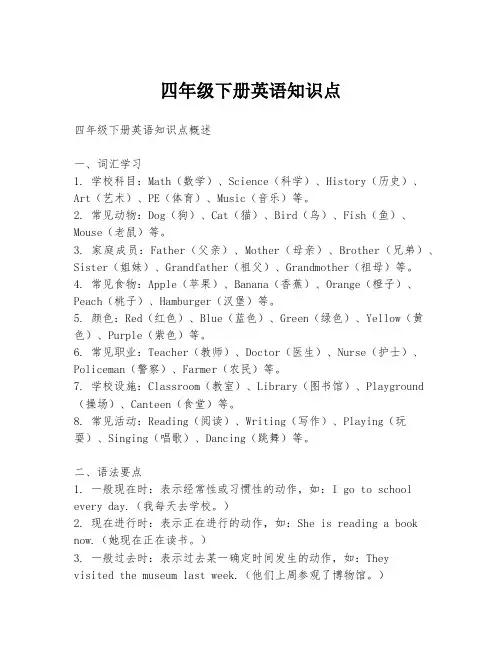
四年级下册英语知识点四年级下册英语知识点概述一、词汇学习1. 学校科目:Math(数学)、Science(科学)、History(历史)、Art(艺术)、PE(体育)、Music(音乐)等。
2. 常见动物:Dog(狗)、Cat(猫)、Bird(鸟)、Fish(鱼)、Mouse(老鼠)等。
3. 家庭成员:Father(父亲)、Mother(母亲)、Brother(兄弟)、Sister(姐妹)、Grandfather(祖父)、Grandmother(祖母)等。
4. 常见食物:Apple(苹果)、Banana(香蕉)、Orange(橙子)、Peach(桃子)、Hamburger(汉堡)等。
5. 颜色:Red(红色)、Blue(蓝色)、Green(绿色)、Yellow(黄色)、Purple(紫色)等。
6. 常见职业:Teacher(教师)、Doctor(医生)、Nurse(护士)、Policeman(警察)、Farmer(农民)等。
7. 学校设施:Classroom(教室)、Library(图书馆)、Playground (操场)、Canteen(食堂)等。
8. 常见活动:Reading(阅读)、Writing(写作)、Playing(玩耍)、Singing(唱歌)、Dancing(跳舞)等。
二、语法要点1. 一般现在时:表示经常性或习惯性的动作,如:I go to school every day.(我每天去学校。
)2. 现在进行时:表示正在进行的动作,如:She is reading a book now.(她现在正在读书。
)3. 一般过去时:表示过去某一确定时间发生的动作,如:Theyvisited the museum last week.(他们上周参观了博物馆。
)4. 可数名词与不可数名词:区分名词的可数性,如:a book(一本书)与some water(一些水)。
5. 代词的使用:主格代词(I, you, he, she, it, we, they)与宾格代词(me, you, him, her, it, us, them)的正确使用。
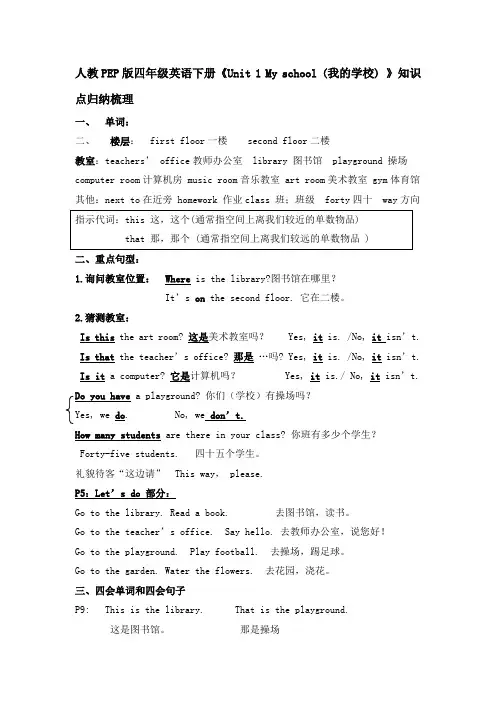
人教PEP版四年级英语下册《Unit 1 My school (我的学校) 》知识点归纳梳理一、单词:二、楼层: first floor一楼 second floor二楼教室:teachers’ office教师办公室 library 图书馆 playground 操场computer room计算机房 music room音乐教室 art room美术教室 gym体育馆其他:next to在近旁 homework 作业class 班;班级 forty四十 way方向二、重点句型:1.询问教室位置: Where is the library?图书馆在哪里?It’s on the second floor. 它在二楼。
2.猜测教室:Is this the art room? 这是美术教室吗? Yes, it is. /No, it isn’t. Is that the teacher’s office? 那是…吗? Yes, it is. /No, it isn’t. Is it a computer? 它是计算机吗? Yes, it is./ No, it isn’t.你们(学校)有操场吗?. No, we don’t.How many students are there in your class? 你班有多少个学生?Forty-five students. 四十五个学生。
礼貌待客“这边请” This way, please.P5:Let’s do 部分:Go to the library. Read a book. 去图书馆,读书。
Go to the teacher’s office. Say hello. 去教师办公室,说您好!Go to the playground. Play football. 去操场,踢足球。
Go to the garden. Water the flowers. 去花园,浇花。
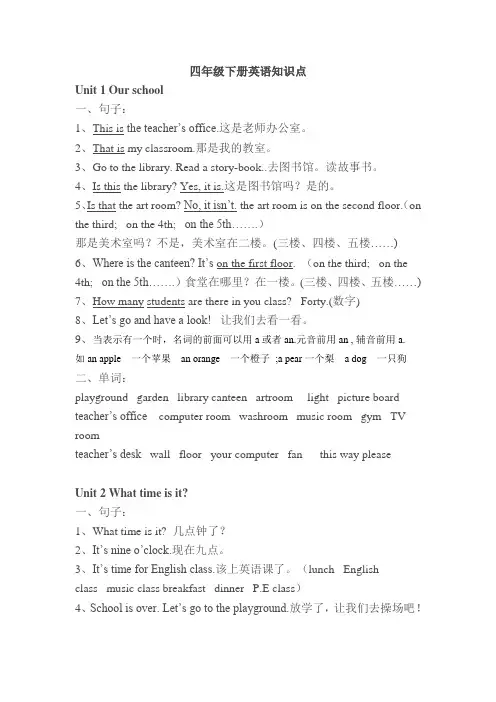
四年级下册英语知识点Unit 1 Our school一、句子:1、This is the teacher’s office.这是老师办公室。
2、That is my classroom.那是我的教室。
3、Go to the library. Read a story-book..去图书馆。
读故事书。
4、Is this the library? Yes, it is.这是图书馆吗?是的。
5、Is that the art room? No, it isn’t. the art room is on the second floor.(on the third; on the 4th; on the 5th…….)那是美术室吗?不是,美术室在二楼。
(三楼、四楼、五楼……)6、Where is the canteen? It’s on the first floor. (on the third; on the4th; on the 5th…….)食堂在哪里?在一楼。
(三楼、四楼、五楼……)7、How many students are there in you class? Forty.(数字)8、Let’s go and have a look!让我们去看一看。
9、当表示有一个时,名词的前面可以用a或者an.元音前用an , 辅音前用a.如 an apple一个苹果an orange一个橙子;a pear 一个梨 a dog一只狗二、单词:playground garden library canteen artroom light picture board teacher’s office computer room washroom music room gym TV roomteacher’s desk wall floor your computer fan this way pleaseUnit 2 What time is it?一、句子:1、What time is it? 几点钟了?2、It’s nine o’clock.现在九点。
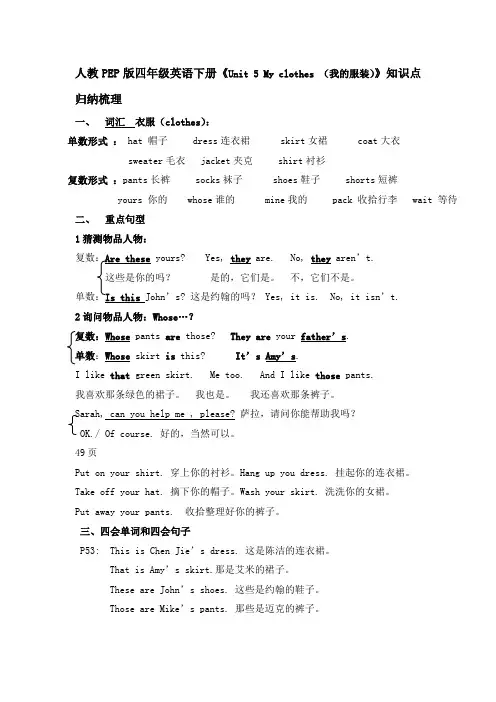
人教PEP版四年级英语下册《Unit 5 My clothes (我的服装)》知识点归纳梳理一、词汇衣服(clothes):单数形式:hat 帽子 dress连衣裙 skirt女裙 coat大衣sweater毛衣 jacket夹克 shirt衬衫复数形式:pants长裤socks袜子shoes鞋子 shorts短裤yours 你的 whose谁的 mine我的 pack 收拾行李 wait 等待二、重点句型1猜测物品人物:yours? Yes, they are. No, they aren’t.是的,它们是。
不,它们不是。
单数:Is this John’s? 这是约翰的吗? Yes, it is. No, it isn’t.2询问物品人物:Whose…?复数:Whose pants are those? They are your father’s.单数:Whose skirt is this? It’s Amy’s.I like that green skirt. Me too. And I like those pants.我喜欢那条绿色的裙子。
我也是。
我还喜欢那条裤子。
Sarah, can you help me , please? 萨拉,请问你能帮助我吗?OK./ Of course. 好的,当然可以。
49页Put on your shirt. 穿上你的衬衫。
Hang up you dress. 挂起你的连衣裙。
Take off your hat. 摘下你的帽子。
Wash your skirt. 洗洗你的女裙。
Put away your pants. 收拾整理好你的裤子。
三、四会单词和四会句子P53: This is Chen Jie’s dress. 这是陈洁的连衣裙。
That is Amy’s skirt.那是艾米的裙子。
These are John’s shoes. 这些是约翰的鞋子。
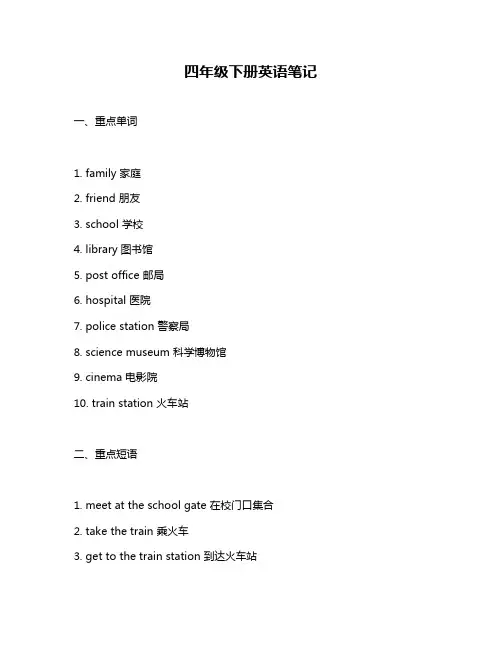
四年级下册英语笔记一、重点单词1. family 家庭2. friend 朋友3. school 学校4. library 图书馆5. post office 邮局6. hospital 医院7. police station 警察局8. science museum 科学博物馆9. cinema 电影院10. train station 火车站二、重点短语1. meet at the school gate 在校门口集合2. take the train 乘火车3. get to the train station 到达火车站4. on the way to the library 在去图书馆的路上5. post a letter 寄信6. buy some books 买书7. go to the cinema 看电影8. see a film 看电影9. go to the hospital 去医院10. be ill 生病三、重点句型1. Where do you live? 你住在哪里?I live in + 地点。
我住在+地点。
2. How do you get to + 地点?你怎么到达+地点?I get to + 地点 + by + 交通方式。
我通过+交通方式+到达+地点。
3. What do you do at the weekend?你周末做什么?I often + 动词。
我经常+动词。
偶尔会+动词。
有时+动词。
4. What are you going to do this weekend?你这个周末打算做什么?I’m going to + 动词。
我打算+动词。
四年级英语下册重点知识点归纳四年级英语下册重点知识点第一单元:一、对应词my–your I–you our—your我的-你的我-你我们的-你们的this– that here –there这个-那个这儿-那儿yes—no come—go his—herteacher—studentboy—girl二、知识点1、表示在几楼上,要用介词on,如onthe first floor.在一楼。
Thefirst表示第一的,序数词在使用时前面一定要加the,表示事物的排列顺序。
2、介绍离自己近的事物时用this is…., 介绍离自己比较远的事物时用thatis…如:This is my computer.这是我的计算机。
That is yourcomputer.那是你的计算机。
3、howmany…?多少?用来询问物品的数量有多少,后面只能跟名词的复数形式。
如Howmany books do you have?你有多少本书?4、当表示有一个时,名词的前面可以用a或者an.元音前用an, 辅音前用a.如 anapple一个苹果anorange一个橙子a pear 一个梨adog一只狗5、当用Is this…? Isthat…?提问时,一般用肯定回答是:Yes,it is .否定是: No , it isn’t.第二单元:1、同义词:supper ===dinner晚饭2、say(第三人称单数)――says3、同义句:What time is it? ===What’sthe time?现在几点了?4、Let’s…后面直接跟动词的原形。
如:Let’sgo! 让我们走吧!Let’s clean theclassroom.让我们打扫教室吧!5、It’s time for…后面跟名词。
如:It’s time fordinner. 该吃晚饭了。
It’s time for Englishclass.该上英语课了。
It’s time to…后面跟动词。
小学四年级英语下册期末复习知识点Unit1 Our school 我们的学校一、词汇(一)四会词语即听说读写computer 计算机board 板黑板fan 风扇light 灯this 这个is 是my 我that那个your 你的teacher's desk 办公桌picture 图画、照片wall 墙floor 地板yes 是的it它(二)三会词语即听说认读playground 操场garden 花园teacher's office教师办公室library 图书馆canteen 餐厅art room 美术室computer room 电脑室washroom 盥洗室music room 音乐教室gym 体育馆TV room (三)短语Go to the garden.Water the flowers.去花园。
浇花。
Go to the the library. Read a story-book.去图书馆阅读故事书。
Go to the the canteen. Eat some noodles.去餐厅吃点面条。
Go to the the teacher's office. Hand in the homework.去老师办公室交作业。
Go to the the playground. Play the football.去操场踢足球。
二、句型 1、问句Where is the canteen? 餐厅在哪里 Where 是对地点的提问。
答句It’s on the first / second floor. 在一/二楼。
2、This is the teacher’s office. 这个是教师办公室。
This is+…这个是… 3、That is my classroom. 那个是我们教室That is…那个是… 4、How many students are there in your class? 在你班里有多少个学生How many 是对数量的提问答句中必须有数字。
四年级下册英语课本基础知识点本文档旨在总结四年级下册英语课本中的基础知识点,帮助学生复和巩固所学内容。
Unit 1: How do you study for a test?- 重点词汇及短语:study, test, write, read, practice, say, listen, make flashcards- 重点句型:How do you study for a test? I study by...- 重点语法:Present simple tense (affirmative, negative, and interrogative forms)Unit 2: I love animals!- 重点词汇及短语:animal, dog, cat, bird, fish, pet, zoo, monkey, panda, tiger- 重点句型:What animals do you like? I like...- 重点语法:Plural nounsUnit 3: What's the weather like today?- 重点词汇及短语:weather, cloudy, sunny, rainy, snowy, windy, hot, cold, warm- 重点句型:What's the weather like today? It's...- 重点语法:Adjectives to describe the weatherUnit 4: What's your favorite food?- 重点词汇及短语:food, apple, banana, cake, ice cream, hamburger, pizza, noodles, rice- 重点句型:What's your favorite food? My favorite food is...- 重点语法:Possessive pronouns (my, your, his, her)Unit 5: My school day- 重点词汇及短语:school, class, teacher, student, book, pen, pencil, bag, desk, chair- 重点句型:What do you have on Monday? On Monday, I have...- 重点语法:Present simple tense (wh- questions)Unit 6: We are going to the zoo.- 重点词汇及短语:zoo, elephant, giraffe, lion, bear, kangaroo, panda, camel, dolphin- 重点句型:What are you going to do? We are going to...- 重点语法:Future with 'be going to'以上是四年级下册英语课本的基础知识点总结。
人教版小学PEP英语四年级下册知识点归纳Unit 1 My School一、核心词汇与学校相关的名词:school 学校 library图书馆 playground操场homework 作业class 班;班级2.数词: forty 四十3.短语:teachers office教师办公室 computerroom计算机房artroom美术教室 music room音乐教室nextto紧邻;在……近旁on the first floon在一楼on the second floor 在二楼二、了解词汇1.其他与学校相关的名词: classroom 教室gym 体育馆2.其他数词:one一two二three三ten十3.短语:close to 挨着……on the third floor 在三楼on the fourth floor 在四楼read a book看书play football 踢足球water the flowers 浇花三、核心句型1.- Where's the teachers'office? 教师办公室在哪里?- It's on the second floor.它在二楼。
解读:“Where is …?”意思是“……在哪里?”用来询问某人或某物的位置。
例:一Where is your classroom?你们的教室在哪里?- It's on the first floor.它在一楼。
2.- Is that the computer room? 那是计算机房吗?- No, it isn't. It's the teachers'office.不,不是。
它是教师办公室。
解读:“Is that …?”是向他人确认某物或某地是不是某事物或某地的常见句型。
肯定回答用“Yes,it is.”,否定回答用“No,it isn t.”。
例: - It this your art room?这是你们的美术教室吗?- Yes, it is.是的,它是。
四年级英语下册知识点梳理Unit 1 Our school subjects一、重点词组:1. our new timetable 我们的新课表2.an Art lesson 一节美术课3.like Chinese / Maths /English 喜欢语文/数学 /英语4.what subjects 什么课程(科目)5. go to the playground 去操场6. what lessons 什么课7. this morning /afternoon /evening 今天早上/下午/晚上8. at school 在学校二、重点句型:1. Welcome back to school. 欢迎回到学校。
2. Nice to see you. 见到你很高兴。
3. It’s time for PE. 该上体育课了。
4. What subjects do you like? 你喜欢什么科目?5.I like Art and Music. 我喜欢美术和音乐三、重点语言知识1.课程类单词首字母都要大写,如:A rt,C hinese,E nglish等。
2. Welcome back to school. 欢迎回到学校。
Welcome to our school. 欢迎来到我们的学校。
3.Nice to meet you. 用于陌生人首次见面打招呼用语。
Nice to see you. 用于熟人之间好久不见再次见面时打招呼用语。
4.询问别人意见时可以说:What about you? 和 How about you?的用法相近,可以替换使用。
5. 到时间该做某事;It’s time for + 名词;It’s time to + 动词。
例如:It’s time for school. = It’s time to go to school.到时间该上学了。
6. subject 表示“学科,科目”。
class 指课堂、上课、班级,强调形式。
lesson 指功课、课业,教材中的一课,强调容。
7. this morning和this afternoon表示今天上午或者下午8.字母Aa在开音节单词中读【ei】,如cake,grape,make,skate等。
清晨wake,来到lake , 钓上snake, 放下plate ,赶到gate , 已经lateUnit 2 After school一、重点词组:1. after school 放学后2.play table tennis 打乒乓球3. a football match 一场足球比赛4.a swimming lesson 一节游泳课5.on Saturday 在星期六6. get up at five 五点起床7. every day 每天二、重点句型:1.What day is it today?今天星期几?2.It’s Friday. 今天星期五。
3.What lessons do you have?你/你们有什么课?4.I/We have Chinese and Maths. 我/我们有语文和数学。
5.He/She has an English lesson. 他/她有一节英语课。
6.What a pity!多么遗憾呀!三、重点语言知识1. after school 类似的说法还有after class /after breakfast2. We don’t have any lessons on Saturday.星期六我们没有课。
any 用于否定句和疑问句。
如:I don’t have any apples. 我没有苹果。
Do you have any lessons on Sunday ? 你星期天有课吗?3. She has a swimming lesson too.她也有一节游泳课。
Have/ has : 有当主语是第三人称单数时要用has。
has 是 have的第三人称单数形式。
如:I have a doll. She has a doll.4.on Saturday :星期前用onat five 点时间前用at5.字母a 在闭音节中发音【æ】:Match,Sam ,Saturday,Maths , back, that 我家dad 脾气bad 让我sad,有只cat,非常fat, 专吃ratUnit3 My day一、重点词组1.get up 起床2.go to school 去学校3.play football 踢足球4.go home 回家5.have dinner 吃晚饭6.watch TV 看电视7.go to bed 去睡觉 8.in the morning 在早上9.in the afternoon 在下午 10.in the evening 在晚上11.at night 在夜晚 12.do my homework 做作业13.have breakfast 吃早饭 14.have four lessons 有四节课14.at four forty 在四点四十 15.at six fifteen 在六点十五16.over there 在那边二、重点句型1.When do you have lunch? 你什么时候吃午饭?2.I usually have lunch at twelve. 我通常在12点在吃午饭。
3.What a big cake! 多么大的一个蛋糕呀!三、重点语言知识1.My day.我的一天。
day在这里主要是指一天的生活、学习、工作和活动。
eg:Have a nice day!祝你一天快乐!2.When do you go to school?你什么时候去上学?When do you…?询问某人在什么时候做某事时的用语。
3.I usually go to school at seven forty.我通常七点四十去上学?(1)I usually…at…告诉别人自己通常在某个时间做某事。
I usually后跟动词原形,at之后接具体时间点。
(2)go to school是“去上学”的意思。
school前面不用冠词。
类似的词组还有go to class去上课,go to bed在睡觉,go to work去上班。
(3)at,in,on都可以和时间连用,但是用法不同。
at表示在“某时刻”,如at one o’clock, at three fifteen, at five thirty等。
in表示在“一段时间”,如in the morning,in the afternoon ,in theevening等。
on表示在“某一天,某天上午、下午或晚上”如:on Sunday, on mybirthday,on Christmas day,on Monday evening.3.I have lunch at twelve.我在十二点吃午饭。
have在这里是“吃”的意思。
eg:have breakfast/dinner/supper吃早饭、晚饭4.I do my homework at five thirty.我在五点半做家庭作业。
do one’s homework 做某人的家庭作业,one’s要随着主语的变化而变化,选用不同的物主代词。
5.What time is it now?现在几点了?“What time…?”是用来询问具体什么时刻的特殊疑问句。
其同义句为“What’s the time?”答句为“It’s…”。
如果答语是整点时间,可在其后加上o’clock。
6.字母e,和ee 的发音/i:/: me she green sleep threeUnit4 Drawing in the park一、重点词组1.in the park 在公园2.draw some pictures 画一些画3.over there 在那边4.on the river 在河上5.have a look 看一看6.try again 再试一次7.on the lake在湖上 8.good idea好主意9.well done干得好二、重点句型1.What can you see?你能看到什么?2.I can see two flowers.我能看到两朵花。
3.Can you draw them?你会画它们吗?4. It’s easy./It’s difficult.它很容易。
/它很难。
三、重点语言知识1、Let’s draw some pictures here. 让我们在这儿画些画吧。
“Let’s…=Let us…”,意为“让我们……吧”,是建议大家一起做某事的祈使句句式。
其答句为“OK./All right./Great!/Good idea!”2、What can you see over there?你看那边是什么?*see在这里是“看见、看到”的意思,强调看的结果。
eg:Can you see a cake over there?你能看见那里的蛋糕吗?*look通常用来引起对方的注意,强调看的动作。
eg:Look!That’s my father.看!那是我爸爸。
如果表示看人或物时,则用look at。
eg:Look at the blackboard,please.请看黑板。
*watch强调“专注”地看,意思是“观看、关注”,常用来指看电视、球赛或戏剧等移动着的画面或物体。
eg: I usually watch TV at seven.我通常七点看电视。
在表示看电影、演出、比赛时也可以用see。
eg:watch/see a film, watch/see a play, watch/see a ball game3.I can see a tree and some flowers.我能看到一棵树和一些花。
“I can…”是表示我能或会做某事的述句,can后接动词原形。
4.Can you draw them?你能画它们吗?“Can you…?”意为“你能……吗?”是询问对方会不会做某事时的一种常用语。
其主语也可以换成其他人称。
5. It’s difficult , but I can try.这很困难,但我能试一试。
此句是由but连接的转折句,but是转折连词,用来连接前后截然相反或相对的两个分句。
6.字母e 在闭音节中的发音/e/:bed ,desk, pen,red, ten.撇下net,鱼没get,衣服wet , 为捉 pest,从不rest, 本领best .Unit 5 Seasons一、重点词组:1. in spring 在春天2. in summer 在夏天3. in autumn 在秋天4. in winter 在冬天5. four seasons 四个季节6. fly kites 放风筝7. go swimming 去游泳 8. go climbing 去爬山9. go skating 去溜冰 10. go fishing 去钓鱼11. go running 去跑步 12. go boating 去划船13. make snowmen 堆雪人 14. after class 下课后15. a fine day 一个晴朗的日子 16. a cold day 寒冷的一天17. a hot summer 一个炎热的夏天 18. eat ice creams 吃冰淇淋19. have picnics =have a picnic 野餐 20. your jacket 你的夹克衫21. whose coat 谁的外套 22. all like the kite 都喜欢这个风筝23. on a sunny day 在一个灿烂的日子里二、重点句型:1. It is warm/hot/cool/cold.天气温暖/炎热/凉爽/寒冷。